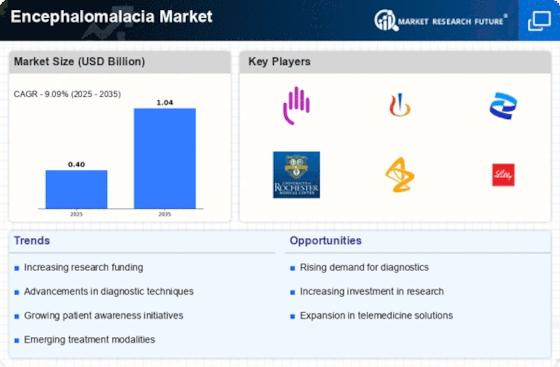Market Share
Encephalomalacia Market Share Analysis
The encephalomalacia market targets brain cell softening and damage. You must understand encephalomalacia's causes, develop new treatments, and form strong partnerships with healthcare providers to succeed in this niche industry. Traumatic brain damage, sickness, or blood vessel problems can cause encephalomalacia. Companies must grasp these causes to develop encephalomalacia-specific drugs. Companies explore innovative treatments for encephalomalacia since it's so difficult to treat. This comprises neuroprotective drugs, rehabilitation tools, and therapies to stop damage and speed healing. Good ties with neurologists, rehabilitation experts, and other health care providers are crucial. Working together, businesses can learn about encephalomalacia's clinical details. This ensures their treatment regimens satisfy better neurological care standards. Brain abnormalities affect markets worldwide, and markets may vary. Companies intend to enter new overseas markets by adapting their products and patient treatment to diverse regulatory, healthcare, and cultural systems. Encephalomalacia awareness is crucial to market positioning. Companies participate in patient-help programs. They provide educational materials, support networks, and early identification and treatment to patient groups and professionals. Telehealth helps those who need aid remotely, so companies set up virtual consultations, tracking, and therapy sessions. This increases the market and makes it easier for patients and caregivers to reach, especially when moving is difficult. Legal difficulties must be overcome to enter the market. Companies seek orphan drug status to treat encephalomalacia for benefits and exclusive rights. Following regulators' regulations ensures safe and effective products. Treatment for encephalomalacia might be expensive. Companies set rates to be profitable and affordable and work hard to convince insurance companies to pay them. This makes specialized care easier to access. Companies engage with academic and research institutes to study encephalomalacia. These relationships make cutting-edge research easier to access, allowing organizations to employ the latest information in their treatment strategies. Full post-treatment support is crucial for market success. Companies provide rehabilitation, treatment, and family support to reduce the long-term impacts of encephalomalacia and improve quality of life. Because patients and therapies improve, the encephalomalacia market changes. Tracking and analyzing data changes company tactics constantly. This allows their goods and services to adapt to new neurological care issues and breakthroughs.


















Leave a Comment